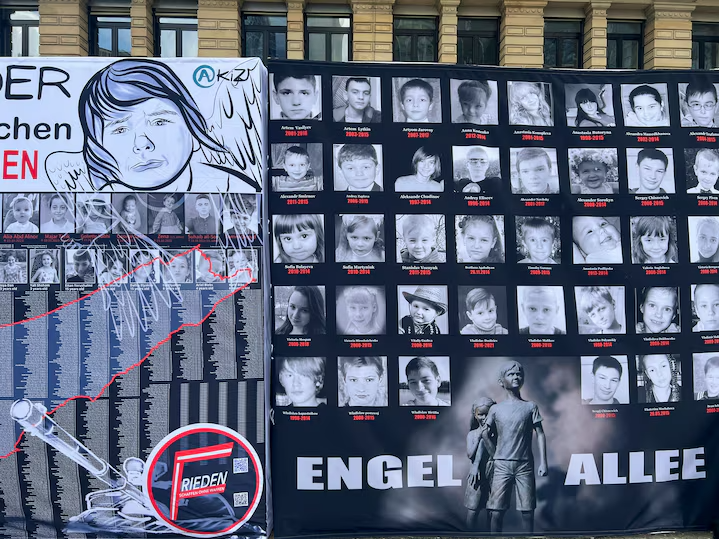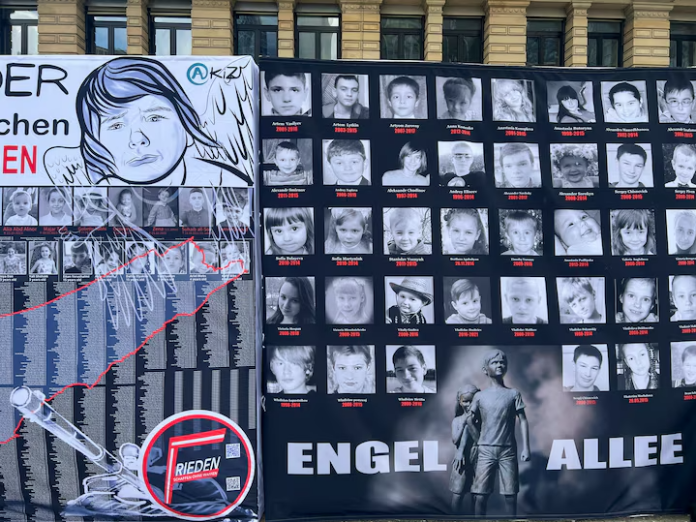A Disturbing Campaign Unfolding in Germany
A photo exhibit traveling through Germany, titled “Alley of Angels”, presents itself as a memorial to children who lost their lives in the Russia-Ukraine war. At first glance, it appears to be a humanitarian initiative highlighting the suffering of innocent victims. However, a deeper investigation reveals a disturbing reality—this exhibit is part of a sophisticated Russian propaganda effort designed to undermine German support for Ukraine.
Behind this campaign is a network with direct ties to Moscow, working to sway public opinion and weaken European resolve against Russia’s ongoing aggression. The operation comes at a critical moment, as German authorities report increased Russian interference ahead of national elections.
The Hidden Hand of the Kremlin
While the exhibit’s organizers claim to be independent activists, evidence uncovered by Reuters suggests otherwise. A European intelligence agency provided intercepted documents showing that individuals with connections to the Russian state coordinated and promoted the Children of War campaign behind the exhibit.
These documents, believed to be reports from operatives in Germany to their handlers in Moscow, contain photographs of the exhibit at German political protests and updates on its impact.
The campaign’s underlying message? That Western nations should stop arming Ukraine. This aligns perfectly with Russia’s broader strategy of using misinformation and influence operations to fracture European unity.
Germany: A Key Target of Russian Interference
Germany has become a battleground in Russia’s information war. As Ukraine’s second-largest weapons supplier after the U.S., Berlin plays a crucial role in supporting Kyiv. In response, Russia has intensified its efforts to disrupt Germany’s political landscape.
Germany’s domestic intelligence agency, the BfV, has warned of Moscow’s attempts to manipulate public sentiment ahead of upcoming elections. The goal? To install a government more sympathetic to Russian interests. Similar operations have been reported in Poland and other European nations, where Russia-backed groups have sought to sway election outcomes through misinformation.
Who is Behind the ‘Alley of Angels’ Exhibit?
At the center of this propaganda effort is Oksana Walter, a Soviet-born schoolteacher living in Germany. She denies any links to the Russian state, insisting that her initiative is purely humanitarian. However, Reuters uncovered connections between her campaign and Russian intelligence-linked organizations.
One of the main promoters of the Children of War campaign is ANNA-News, a Russian news agency affiliated with the GRU (Russia’s foreign military intelligence service). ANNA-News has a history of advancing Kremlin propaganda and has actively supported Walter’s activities.
Further investigation linked the campaign to Vitaly Konovalov, a current GRU officer based in Moscow. When Reuters attempted to contact him, he immediately ended the call. Other Moscow-based individuals with intelligence and media connections have also played a role in amplifying the exhibit’s reach.
The Exhibit’s Political Ties in Germany
The Alternative for Germany (AfD) party, known for its pro-Russian stance, has shown interest in the Alley of Angels exhibit. Former AfD lawmaker Ulrich Oehme publicly supported the initiative, aligning with Russia’s broader push to gain influence within Germany’s political system.
At a far-right demonstration in Frankfurt, the exhibit was prominently displayed alongside AfD party materials, further highlighting the overlap between pro-Kremlin messaging and Germany’s nationalist movements.
A Broader Disinformation War

Russia’s influence campaigns extend beyond Germany. Similar disinformation efforts have been uncovered across Europe, targeting elections and public discourse. In Poland, authorities recently exposed a Russian group attempting to manipulate voters ahead of the country’s presidential election.
These tactics are not new. The Kremlin has long used fabricated narratives and emotionally charged imagery to shape global opinion. The “Alley of Angels” exhibit is just the latest example of this playbook in action.
What’s at Stake?
The war in Ukraine remains Europe’s bloodiest conflict since World War II, and its outcome will shape the continent’s future. Russia’s attempts to manipulate public perception are designed to weaken support for Ukraine, ultimately making it harder for Kyiv to defend itself.
With elections approaching, German authorities must remain vigilant. The public should also be aware of how propaganda operates—emotional imagery and humanitarian appeals can be weaponized to serve political agendas.
Final Thoughts
The “Alley of Angels” exhibit is more than just a memorial—it’s a well-crafted tool in Russia’s ongoing information war. By understanding the forces behind such campaigns, Germany and the rest of Europe can better protect themselves from foreign influence operations.



